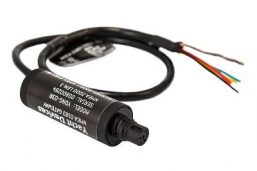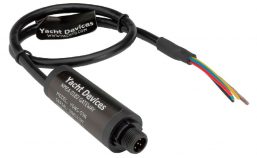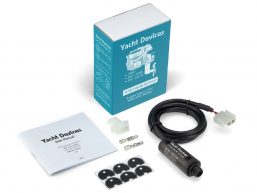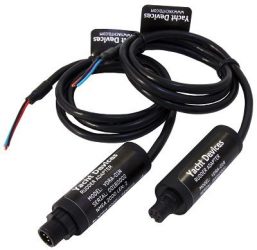Digital Barometer YDBC-05
The Barometer is intended for measuring atmospheric pressure within the range from 300 to 1100 hPa or mbar (225 to 825 mmHg), it provides chart plotters and instrumental displays with barometric pressure data.
This product is designed for weather monitoring. The sensor is located inside the device case. Many chartplotters and digital navigation instruments are able to display data on pressure in the form of graphs (modern Vulcan7, old ST70) or show a trend indicator; this allows tracking of trends in the weather change.
Pressure data output resolution to a NMEA 2000 Version 3 network is 0.01 hPa (mbar), absolute measurement accuracy is ±1 hPa, relative measurement accuracy is ±0.12 hPa. We also recommend our Humidity Sensor YDHS-01, it will provide your instruments with relative humidity, air temperature and calculated dew point temperature.
Digital Barometer YDBC-05R and YDBC-05N
Picture 1. Digital Barometers YDBC-05R (left) and YDBC-05N (right), see more
Device is plug and play, works right our of the box and does not require any settings. Calibration of the Barometer has been performed by the manufacturer. Therefore, you can set an offset from -10.0 to +10.0 hPa for the sensor readings to align with readings from other ship equipment. Programming of the NMEA 2000 device instance, system instance, data instance, description strings is also supported.
The Barometer can be configured by user to turn on or off specified channels of digital switching equipment. The conditions can be either the actual atmospheric pressure or the difference between actual pressure and the pressure 30 minutes or 1 hour ago. This allows a warning to be set concerning the rise or fall of pressure and upcoming weather changes (see Section VIII of the Manual for details).
The measurements of the last 48 hours are stored in the Device’s RAM and can be retrieved by compatible software or hardware to provide the user with historical data.
All our sensors support firmware updates and three programming (configuration) methods. The simplest way is to use a special installation description string which can be entered for the device in some modern models of chart plotters or in special software. Here you can see a video how to program the Humidity Sensor using CAN Log Viewer software, programming of the Barometer is the same.
See our old video with reviews of devices, installation on a sailing yacht and programming from a Raymarine C90W chart plotter. Thid is a tricky way, but it works almost everywhere and no special equipment is required.
Support of the Barometer in our other products:
Web Gauges of NMEA 2000 Wi-Fi Gateway, NMEA 0183 Wi-Fi Gateway and NMEA 0183 Wi-Fi Router can display atmospheric pressure graph or data bar;
the Barometer can automatically manage loads connected to the Circuit Control YDCC-04;
the NMEA 0183 Gateway and NMEA 2000 USB Gateway convert atmospheric pressure to NMEA 0183 MDA sentence and vice versa;
the PC software of Voyage Recorder use atmospheric pressure in spreadsheets, GPX tracks and log books;
the Text Display shows atmospheric pressure along with humidity and other environmental data;
the CAN Log Viewer can update Device’s firmware, configure it, and display measured data.
The Barometer is certified by National Marine Electronics Association. The Device is designed for operation in an NMEA 2000 network and is compatible with a wide range of equipment supporting this protocol. Raymarine SeaTalk NG, Simrad SimNet, and Furuno CAN networks are branded versions of NMEA 2000 and differ only by connector type. Garmin uses the NMEA 2000 Micro connector in its devices, which is compatible with the DeviceNet Micro connector.
The Device is supplied with SeaTalk NG (YDBC-05R) and NMEA 2000 Micro Male connectors (YDBC-05N), making it possible to connect it to networks of different manufacturers without any adapters. The Device model is shown on the case.
No free connectors on your bus? Not a problem! Device models with the T index at the end of their names contain a built-in terminator and are connected to the network instead of a terminator. This allows zero-cost connection of the Device to existing networks with no available connectors.









